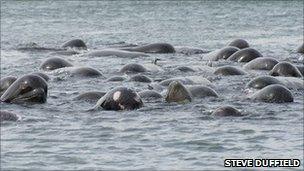Pilot whales leave Loch Carnan following death
- Published
The animal will be examined to find out why it died
A pod of more than 60 pilot whales, at risk of beaching, has again left a Hebridean loch after one of them died.
The animals had left the shallow waters of Loch Carnan in South Uist on Saturday, however returned during the night when the beaching took place.
A post-mortem examination suggested the young female died from a disease, not because it was stranded on rocks.
Marine experts said the rest of the pod had now left the loch and appeared to be heading south.
Dr Andrew Brownlow, who carried out the autopsy, said the whale showed signs of having suffered a serious disease and its injuries were not bad enough to have killed it.
That could indicate that head injuries suffered by a number of other members of the group are not life-threatening.
Rescue teams have been searching the islands and inlets of the loch but have not found any other whale carcasses.
The British Divers Marine Life Rescue team has now been forced to withdraw due to worsening weather conditions.
The team is planning to leave South Uist on Monday but will leave behind essential kit, in case the whales are seen close to the shores of the island over the next few days.

Wildlife tour operator Steve Duffield captured this image of the whales
The whales were first spotted around Loch Carnan on Thursday, sparking fears that they would perish in a mass stranding.
There had been concerns after about 20 of the pod were spotted with head injuries, thought to have been sustained while in the shallow water.
The Scottish government lent rescuers a fisheries protection boat to follow the animals' movements.
Alisdair Jack, Scottish National Organiser of the BDMLR, said: "The reasons why whales beach themselves is not known, however illness can be a factor.
"We are hopeful that the remaining members of this pod have now left the vicinity and moved out to sea.
"The support provided by the Scottish government, and by the MPV Hirta in particular, have been very much appreciated by the BDMLR."
'Greater tragedy'
Environment Minister Stewart Stevenson said: "I am pleased to hear that the pod has left the loch and hope they remain in deeper waters.
"The loss of life is very unfortunate but a number of teams working together in South Uist have ensured that a greater tragedy has been averted.
"Given the death of one whale, and clear injuries to a number of other animals, the MPV Hirta will continue to search for the pod and provide monitoring assistance."
At the end of October last year, some pilot whales almost got stranded in the same sea loch. Less than a week later, 33 whales, believed to be the same group, were found dead on a beach in County Donegal in the Irish Republic.
Pilot whales prefer deep water but come inshore to feed on squid, their main food.
Last week a pilot whale died on Sunday morning after getting stuck in the Sullom Voe inlet in Shetland. An autopsy was carried out on the animal to try to establish why it died but the results are not yet known.
- Published21 May 2011
- Published20 May 2011
- Published7 November 2010
- Published29 October 2010